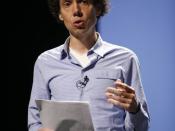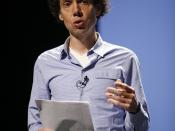In the book "Blink" by Malcolm Gladwell, the central theory that Gladwell presents is that often the decisions and observations made in only a split-second, in the blink of the eye, are better than decisions which are made after extensive thought. To present and justify this idea Gladwell describes the lives of several people who make, or have made, important snap decisions with a high level of success or failure. He then explains the logic behind each story and relates it back to his original principle. The narratives include the story of a fake Greek statue and the debate of it's authenticity, a retired U.S. general who defeated the best of the military with quick thinking, and a group of police officers who killed an innocent immigrant because of a tragic misunderstanding, among many others. While I found many of these anecdotes interesting and do agree to a certain point that on occasion trusting your intuition is more effective than boundless thinking, many of the examples used in Blink oversimplify or misstate the importance of "those first 2 seconds" (8).
One instance in "Blink" where I believe Gladwell is overstating the truth is with his story of Paul Ekman and his technique to evaluate faces to determine whether someone was lying or not. In the book Gladwell writes in a very matter-of-factly way about Ekman and his ability to tell if someone is lying by watching video of them, however if Ekman had actually developed a surefire way to detect a lie, it would revolutionize the justice system. While I do believe Ekman may be better able to make educated guesses due to his research, I don't fully believe that he is as able as Gladwell seems to describe him. Another problem I found with Blink is in Gladwell's...


